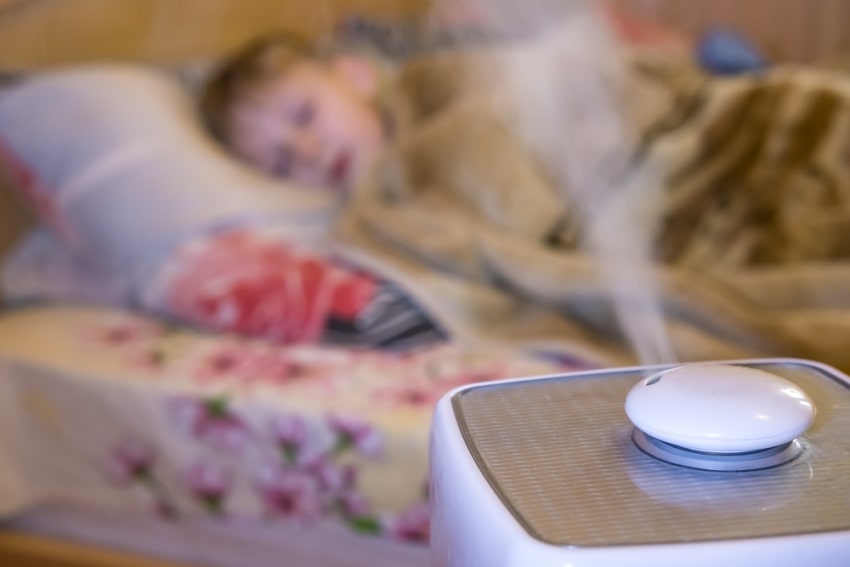Claritin is a common cold and allergy medicine that most people take at least seasonally. We all know that most things pass through breastmilk, but is Loratadine, the active ingredient in Claritin, one of those things? It is.
However, the amount is so small that this medication is considered safe to take while you’re breastfeeding.
What Is Claritin?
Claritin is an antihistamine that is commonly used to treat symptoms associated with allergies, such as seasonal allergies. (My mother had severe allergies and used this religiously.
It does work exceptionally well.) It is sold over the counter in various forms. You can pick up the liquid form, take the pill or capsule, or opt for a chewable version.
Common symptoms it can treat include:
- Itchy, watery eyes
- Itching
- Sneezing
- Running nose
It can help treat hives because it treats itching, but Claritin will not necessarily make them go away.
There are not a lot of side effects to this medication, hence one of the reasons that it is one of the most popular over-the-counter medications used to treat allergies.
Allergic reactions are rare and include symptoms that are impossible to miss, such as a rash, swelling, and trouble breathing. If you experience any side effects, you should call your doctor.
[amalinkspro type=”showcase” asin=”B0026MRY0Y” apilink=”https://www.amazon.com/dp/B0026MRY0Y?tag=mominformedcom-20&linkCode=osi&th=1&psc=1″ new-window=”true” addtocart=”false” nofollow=”true” sc-id=”4″ img-sizes=”500:406″ imgs=”https://m.media-amazon.com/images/I/51DQIIzf10L._SL500_.jpg” link-imgs=”false” specs=”Non-drowsy, 24-hour relief~~~Original prescription strength” btn-color=”#ff9900″ btn-text=”Check Price” alignment=”aligncenter” hide-prime=”0″ hide-image=”0″ hide-price=”0″ hide-button=”0″ width=”750″]Claritin Allergy 24 hr, 10mg, 40-Count Tablets[/amalinkspro]
The active ingredient in Claritin is called Loratadine. Loratadine is a common ingredient found in allergy medication. It’s the only active ingredient found in Claritin.
Does Loratadine Pass Into Breastmilk?
Loratadine is considered a non-sedative antihistamine. Studies have revealed that it is found in breastmilk, but is found at such a low level that it should not be a concern. Because of this, Loratadine is considered one of the few antihistamines that are safe while breastfeeding.
How Does Loratadine Impact A Nursing Infant?
When taken at its lowest dose, most report that there is no impact on the infant. In another study, two breastfeeding mothers reported that their babies were drowsy after they began taking the medication.
It should be noted that when breastfeeding mothers do take any over-the-counter medication they should take the least amount possible, even if the medication is considered safe for breastfeeding mothers to take.
Loratadine is often considered a non-sedative antihistamine, but this is not because it does not have a sedative effect. It’s because the sedative effect is so low that it doesn’t impact most people.
Babies are significantly smaller than adults and are still exposed to Loratadine through breastmilk. Because of that, it could have a sedative effect if taken in larger doses.
In the same study mentioned above, there were no developmental delays or lack of weight gain. In fact, everything with the infants, including the two that were reportedly drowsy, was as it should be.
View in gallery
How To Take Claritin While Breastfeeding
While Claritin is considered safe for both you and your baby, there are a few things to keep in mind if you are taking it while breastfeeding. You do need to keep an eye out for side effects in both yourself and your baby.
Although these are rare, there is a chance that you or your infant could experience side effects. If you notice any, it’s important to stop taking the medication immediately and contact your physician.
Take The Lowest Dose Possible To Alleviate Symptoms
Because Loratadine is passed through breastmilk, you want to take the least amount possible.
If the lowest dose possible does not alleviate your symptoms, take the next highest dose with permission from your doctor. Before changing your dosage, consult with your primary care physician.
Consider Taking It After Your Night Time Feeding
If your little one is already sleeping through the night, you’re more than likely not feeding them in the middle of the night anymore.
Because of this, most breastfeeding moms that are taking Claritin prefer to take it after the final feeding of the night. This greatly decreases the chances that your little one will be exposed to Loratadine through breastmilk.
Consider Alternative Options To Stop Symptoms
Some mothers will not be concerned about the tiny amount of Loratadine that their baby will be exposed to. Others will instantly stop taking the medication or be concerned. I don’t pass judgment on either group.
However, if you’d like to stop taking Claritin, there are other ways that you can find relief from your symptoms. I personally have allergies and do not take over-the-counter medicines for them.
Here are a few things that I’ve found that can work wonders as well as some tips that I’ve heard about.
Pick Up An Air Purifier
[amalinkspro type=”showcase” asin=”B08JM7M8W9″ apilink=”https://www.amazon.com/dp/B08JM7M8W9?tag=mominformedcom-20&linkCode=osi&th=1&psc=1″ new-window=”true” addtocart=”false” nofollow=”true” sc-id=”4″ img-sizes=”497:500″ imgs=”https://m.media-amazon.com/images/I/414lAxkfgSL._SL500_.jpg” link-imgs=”false” specs=”【Air purifier with fragrance sponge and night light function】: add a few drops of essential oil (not included) to the sponge under the air outlet of the purifier, the aroma will diffuse with the air movement; the air purifiers for home have a blue night light Function, long press the switch to turn on or off~~~~~~~~~” btn-color=”#ff9900″ btn-text=”Check Price” alignment=”aligncenter” hide-prime=”0″ hide-image=”0″ hide-price=”0″ hide-button=”0″ width=”750″]TOPPIN HEPA Air Purifiers for Home[/amalinkspro]
An air purifier can help remove allergens from the air, such as pet dander and smoke. Overall, it also will make your home smell much nicer.
Because these remove most of the allergens from the air, you’ll start to experience significantly fewer symptoms. Make sure that the air purifier that you pick up has a HEPA filter.
Create Your Own Sauna
Turn your shower on full blast in the hottest setting possible. Then, close the bathroom door and wait ten minutes.
When you walk back into the bathroom, it will be hot and full of steam, just like a sauna. Sit in your makeshift sauna for 10-20 minutes to relieve congestion.
Acupuncture
I’ve personally never tried acupuncture, but I’ve heard that it works wonders. My previous chiropractor also practiced a lot of ancient Chinese medicine and insisted that acupuncture would work to relieve my allergies.
After doing quite a bit of research, I concluded that it is more than likely effective. However, I’m terrified of needles and opted out of that office visit. If you’re not, acupuncture could work well for you. This review of over ten studies reveals that it can be very effective.
A Teaspoon Of Natural Honey
According to my sister, this is the ultimate solution for allergies. Instead of giving my niece medication, she gave her a teaspoon of locally sourced honey every morning. I can testify that my niece did not suffer from allergies after that.
However, it’s believed that this primarily works with pollen. Because the bees that produce the honey are using pollen in your area to make the honey, it is said to lower your allergic reaction to pollen over time.
This might not be an effective way to treat other allergies, such as those due to pet dander.
Dehumidify The Air
When there is more moisture in the air, it results in mold and mildew growth. These alone can make it hard to breathe, especially if you’re asthmatic. Moisture can also result in increased mucous production.
View in gallery
When there is not as much humidity in the air, you’ll have fewer symptoms. You can accomplish this by picking up a dehumidifier. Some have a HEPA filter and double as an air filter as well. You can also use an air conditioner or central air unit to keep the room less humid.
Look Into Alternative Medicine
Alternative medicine consists of using aromatherapy, essential oils, and even vitamins to help reduce symptoms. Common alternative medicine options for dealing with allergies include:
- Vitamin C to reduce your level of histamines
- Peppermint oil in an oil diffuser
- Eucalyptus oil
- Frankincense oil
- Lavender oil
- Quercetin
- Butterbur
- Probiotics
Some of these work well for certain allergies, such as pollen, and some work better for allergies such as pet dander. Most people have multiple allergies, so it might take a bit of trial and error to determine with essential oil or vitamin will work best to alleviate your symptoms.
FAQs
What Cold And Allergy Medication Is Safe To Take While Breastfeeding?
Generally, Claritin, Zyrtec, and Allegra are considered safe to take while breastfeeding. However, it’s important to consult with your doctor before starting or stopping any type of medication. This also includes cold and allergy medication.
View in gallery
Does Claritin Decrease Milk Supply?
Most mothers find that Claritin does not decrease milk supply. It does not have the same active ingredients that other over-the-counter medications, such as Sudafed, do. Instead, the only active ingredient in Claritin is Loratadine.
What Cold Medications Decrease Breast Milk Supply?
Claritin is not known to decrease milk supply. Cold medications that do decrease milk supply include, but are not limited to, these: Sudafed, Benedryl, any that contain a large amount of menthol, any medications that have pseudoephedrine.
What Can You Take For Allergies While Breastfeeding?
Breastfeeding mothers can typically take Claritin, Zyrtec, and Allegra. They can also utilize home remedies, such as using an oil diffuser for essential oils or taking specific vitamins that are known to help reduce the symptoms of allergies. Acupuncture can also be helpful.
Can You Take Antihistamine While Breastfeeding?
Yes, but you can only take certain antihistamines. Some are considered non-drowsy, such as Loratadine, which makes them a safer alternative to others.
You’ll also want to make sure that studies have been conducted to verify whether a specific antihistamine passes into breastmilk or not to keep your baby safe. If you’re not sure what to take, always consult your doctor first.
In Conclusion
Claritin is generally considered safe to take while breastfeeding. However, Loratadine does pass into breastmilk. If this bothers you, consider natural remedies that can be effective at treating allergies.
*The statements on this blog are not intended to diagnose, treat, cure or prevent any disease.
The author does not in any way guarantee or warrant the accuracy, completeness, or usefulness of any message and will not be held responsible for the content of any message. Always consult your personal physician for specific medical advice.






